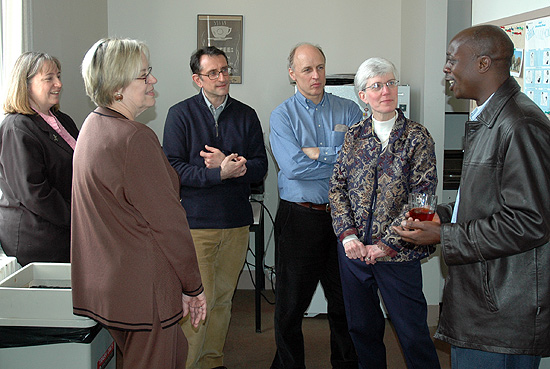South African Librarian Learns about Research Methods at Wesleyan
 |
| At right, Paiki Muswazi, deputy client services librarian at the University of the Witwatersrand in Johannesburg, South Africa, meets with, from left, Jody Schenker, library assistant; Barbara Jones, the Caleb T. Winchester University Librarian; Graziano Kratli, international program support librarian at Yale University; Alec McLane, music librarian and director of the World Music Archives; and Diane Klare, head of reference, during his visit to Wesleyan April 14. |
| Posted 04/21/08 |
| A librarian has traveled from the other side of the world to experience ways librarians in the United States aid researchers.
Paiki Muswazi, deputy client services librarian at the University of the Witwatersrand in Johannesburg, South Africa, included Wesleyan on his U.S. library tour. He visited several library departments on April 14. Im interested in knowing how librarians get data from researchers, and how libraries support the use of data, Muswazi explained during his visit. Im learning how U.S. libraries support research and how libraries give public access to this research. Muswazi is one of six librarians from universities of Cape Town, KwaZulu-Natal and The Witwatersqand visiting various research libraries in the United States for six weeks. He is part of the Research Libraries Consortium project, which aims to transform and enrich support to researchers offered by South African academic libraries. One of the program expectations is for Paiki to visit other libraries in the area, and it is a really nice honor that he had the opportunity to visit Wesleyan, says Barbara Jones, the Caleb T. Winchester University Librarian at Olin Library. Most international librarians only see the big research libraries, and it is important when they get to see the vast array of types of U.S. libraries. The program requires its international visitors to return with an understanding of how librarians interact with researchers; experience day-to-day interaction between librarians and researchers; gain a clear impression of why researchers use the library; shadow research librarians and participate in research activities; participate in discussions where changes in policy are being addressed with regard to research services; and be exposed to and gain an understanding of how technology is used to support research. At Wesleyan, Muswazi toured the librarys reference collection, the Information Commons and the Quantitative Analysis Center. At the University of the Witwatersrand, he is involved in planning a library-based research center called the Research Commons for graduate students and faculty. His university library serves 25,000 students, including 7,000 graduate students. At lunch, he joined the Academic Technology Roundtable discussion. The A(T)R is a shining example of the ways departments collaborate at Wesleyan, Muswazi observed. Muswazi arrived in the United States in mid-March and spent two weeks at the University of Illinois. On March 28, he went to Yale, where hes being hosted for the duration of his time in the U.S. On April 16, Muswazi gathered with his peers in San Francisco, Calif. to discuss their findings. The Research Libraries Consortium project is funded by the Carnegie Corporation of New York. Andrew Carnegie, for whom the corporation is named, spent over $56M to build 2,509 libraries throughout the English-speaking world during his life. |
| By Olivia Drake, The Wesleyan Connection editor |

